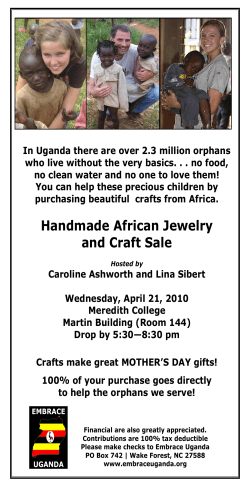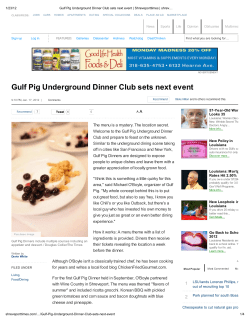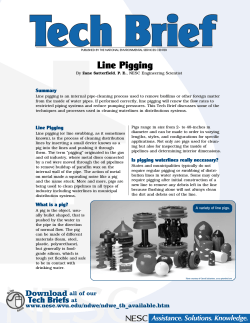
International Livestock Research Institute Training course report How to improve pig farming
International Livestock Research Institute Training course report How to improve pig farming A training workshop by Pig Production and Marketing Uganda Limited February 2014 © 2014 International Livestock Research Institute (ILRI) This publication is copyrighted by the International Livestock Research Institute (ILRI). It is licensed for use under the Creative Commons Attribution-Noncommercial-Share Alike 3.0 Unported License. To view this license, visit http://creativecommons.org/licenses/by-nc-sa/3.0/. Unless otherwise noted, you are free to copy, duplicate, or reproduce, and distribute, display, or transmit any part of this publication or portions thereof without permission, and to make translations, adaptations, or other derivative works under the following conditions: ATTRIBUTION. The work must be attributed, but not in any way that suggests endorsement by ILRI or the author(s) NON-COMMERCIAL. This work may not be used for commercial purposes. SHARE ALIKE. If this work is altered, transformed, or built upon, the resulting work must be distributed only under the same or similar license to this one. NOTICE For any reuse or distribution, the license terms of this work must be made clear to others. Any of the above conditions can be waived if permission is obtained from the copyright holder. Nothing in this license impairs or restricts the author’s moral rights. Fair dealing and other rights are in no way affected by the above. The parts used must not misrepresent the meaning of the publication. ILRI would appreciate being sent a copy of any materials in which text, photos etc. have been used. Written by Kristina Roesel Edited and formatted by Tezira Lore Citation ILRI (International Livestock Research Institute). 2014. How to improve pig farming: A training workshop by Pig Production and Marketing Uganda Limited. Report of a training course held at Matugga, Uganda, 14-15 February 2014. Nairobi, Kenya: ILRI. i Contents Project background .......................................................................................................................... 1 Training summary ............................................................................................................................ 2 Agenda ............................................................................................................................................. 3 Training materials ............................................................................................................................ 3 Participants ....................................................................................................................................... 3 Annex 1: Newspaper clippings on pork safety ................................................................................. 4 Annex 2: Poster on the pork tapeworm cycle ................................................................................... 5 ii Project background Safe Food, Fair Food: From capacity building to implementation (funded by BMZ/GIZ) Millions of small-scale farmers efficiently supply many of the informal meat, milk and fish markets in Africa. Surging demand for livestock products and changing consumer preferences (the Livestock Revolution) provide an opportunity to set poor farmers on pathways out of poverty, but also threaten the continued presence of smallholder farmers in increasingly demanding markets. While the levels of food safety hazards (such as microbial pathogens and residues) in informally marketed food may be high, the risk to human health is mostly unknown and current food safety management is both ineffective and inequitable. Risk-based approaches for assessing and managing food safety offer a powerful new method for reducing the enormous health burden imposed by foodborne disease, while taking into account other societal goals such as pro-poor agri-food sector development and food and nutritional security. The ultimate goal of the second phase of the Safe Food, Fair Food project is the improvement of livelihoods of poor producers and consumers by reducing the health risks and increasing the livelihood benefits associated with meat, milk and fish value chains. Its purpose is furthering research into the practical application of risk analysis and economic and social methods by food safety stakeholders and value chain actors, improving food safety and market participation of the poor in informal markets for livestock products in sub-Saharan Africa. The project contributes to this with outputs at two scales: 1. At the level of meat, milk and fish value chains, it pioneers and tests a practical, wholevalue-chain application of risk-based approaches to food safety in selected countries which are the focus of the CGIAR Research Program on Livestock and Fish. It will develop, test and communicate the technologies and methods to improve food safety and enhance smallholder market access. 2. At regional scale, it works through the food safety ‘champions’ supported in the first phase to better incorporate risk analysis and economic valuation methods into food safety policy, commercial practice and veterinary education. The project works in four countries (Ethiopia, Senegal, Tanzania and Uganda) and with university and research networks and regional economic communities in East, West and southern Africa. It builds directly on previous work supported by the BMZ-funded Safe Food, Fair Food project that increased capacity and generated evidence for improving food safety in eight African countries, training over 50 food safety stakeholders and supporting 20 postgraduate research projects. 1 Training summary Organizer: Christopher Mulindwa, Manager, Pig Production and Marketing (PPM) Uganda Ltd. Lecturers/facilitators Ivine Nadamba (PPM) Danilo Pezo (ILRI) Robert Serwanga Salongo (Mutima Best Quality Feeds) Naluyima Emma (Animal Care Centre Entebbe) Joseph Kung’u (National Agricultural Research Organization/ILRI) Peter Senkungu (Novus International) Kristina Roesel (Freie Universität Berlin/ILRI) Peter Lule (PPM/ILRI) Simon Lubega (Wambizzi Cooperative Society) Lawrence Mayega (DVO Masaka) PPM is a registered company in the Republic of Uganda. The company works with smallholder and medium-scale pig farmers in Uganda to increase productivity and create a reliable market for pig farm produce. Its mission is to modernize, promote and develop pig production in Uganda through providing secure and sustainable markets, advisory services and farm inputs to make the sector a reliable source of income for smallholder and medium-scale pig farmers in Uganda. More information about PPM is available at www.pigfarmers.co.ug and www.facebook.com/pigfarmers. In 2012, the research team at ILRI Uganda met the manager of PPM, Christopher Mulindwa, and has since been working together with him to provide technical support to smallholder pig farmers. Christopher was part of the participatory rural assessment team, facilitating sessions on marketing channels from November 2012 to February 2013. He is very engaged and dedicated and, with the support of ILRI, won a stipend for the 2014 East Africa Agribusiness Innovation Incubator Programme Cohort. Farmers in Uganda are often constrained by lack of learning materials to help them venture into piggery or upgrade their businesses. Therefore, PPM organized a two-day training workshop for 70 farmers against a fee of 65,000 Uganda shillings (25 United States dollars). The training was aimed at giving them insights into relevant topics concerning piggery, such as, pig feeding and use of additives, farm management and housing, economics, record keeping, how to access seed money, pig health and zoonoses, breeding and stock management and marketing. Due to the collaboration with ILRI, the coordinator of the Safe Food, Fair Food project, Kristina Roesel, was invited by PPM to facilitate a session on pig and pork zoonoses. The 90-minute session introduced the subject zoonoses and highlighted the pig and pork-borne zoonoses that ILRI identified during the in-depth assessment in 2013. We discussed the symptoms of disease in pigs and people, risk factors for disease transmission and their management. The life cycle of the pork tapeworm, Taenia solium, is often misunderstood and even wrongly communicated by technical staff. A poster co-developed by ILRI (Annex 1) helped to effectively communicate the life cycle of the pork tapeworm to the farmers, resulting in increased understanding of the concept. One of the farmers expressed interest in translating the poster into Luganda, the local language spoken in most of central Uganda. We also demonstrated preserved specimens of roundworms that were collected from pigs during field work in Uganda in 2013. The event received media coverage in the Daily Monitor newspaper of 19 February 2014: http://www.monitor.co.ug/Magazines/Farming/-Farmers-urged-on-best-practices//689860/2213650/-/cve41e/-/index.html 2 Agenda Time 14 Feb 2014 0800 hours 0900-0910 hours 0910-1000 hours 1000-1030 hours 1030-1100 hours 1100-1230 hours 1230-1300 hours 1300-1400 hours 1400-1500 hours 1500-1530 hours 1530-1600 hours 1600-1615 hours 15 Feb 2014 0900-1000 hours 1000-1030 hours 1030-1100 hours 1100-1200 hours 1200-1220 hours 1220-1300 hours 1300-1400 hours 1400-1500 hours 1500-1530 hours 1530-1640 hours 1600-1650hours Topic Facilitator Organization Registration of participants Welcoming remarks About PPM Introduction of participants Official opening ILRI pig project in Uganda Participants’ reactions Ivine Nadamba PPM PPM Danilo Pezo ILRI Relevance of commercial feeds to pig production in Uganda Robert Serwanga (Salongo) Mutima Best Quality Feeds Pig feeding and farm management Participants’ reactions Centenary Rural Development Bank (Pig farm financing) Pig health management Participants’ reactions Pig feed additives Closing remarks Pig and pork zoonoses (Contact and consumption) Participant reactions Economics of pig farming Pig markets at Wambizzi cooperative abattoir Participants’ reactions Record management Practical application of the sow calendar Practical housing plans Participants’ reactions Pig breeding and stock management Closing remarks Health Break Emma Naluyima Animal Care Centre Entebbe Centenary Rural Development Bank Lunch Break Joseph Kung’u National Agricultural Research Organization/ILRI Peter Senkungu Novus International Kristina Roesel ILRI Kristina Roesel Health Break Peter Lule ILRI Simon Lubega Peter Lule Lunch break Lawrence Mayega Joseph Kung’u PPM, vet & pig market specialist Wambizzi cooperative abattoir Limited. PPM and Wambizzi District Veterinary Office, Masaka National Agricultural Research Organization/ILRI Training materials Local newspaper clippings articles on pork safety (Annex 1) Poster: How to break the tapeworm cycle (Annex 2) Presentation: Pig and pork zoonoses in Uganda (http://www.slideshare.net/ILRI/pig-andpork-zoonoses-in-uganda) Participants The training was attended by 25 women and 45 men, all from Uganda. 3 Annex 1: Newspaper clippings on pork safety https://safefoodfairfood.wordpress.com/2012/06/06/in-the-news-most-pork-in-kampala-is-unsafe-say-health-experts/ Daily Monitor, 6 June 2012 Red Pepper, 13 June 2012 4 Annex 2: Poster on the pork tapeworm cycle 5
© Copyright 2026









